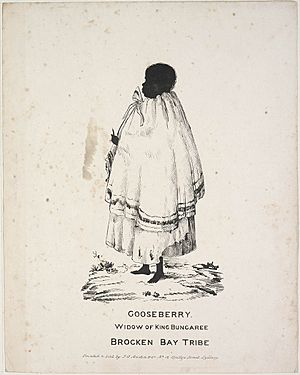Cora Gooseberry facts for kids
Quick facts for kids
Cora Gooseberry
|
|
|---|---|
| Matora Gooseberry | |
 |
|
| Born |
Cora Gooseberry
c. 1777 |
| Died | July 30, 1852 (aged 74–75) Sydney, New South Wales, Australia
|
| Body discovered | Sydney Arms Hotel, Castlereagh Street |
| Nationality | Australian Aborigonal |
| Other names | Queen Gooseberry Lady Gooseberry |
| Occupation | Clan monarch Cultural knowledge keeper |
| Spouse(s) | Bungaree (w. 1830) |
| Parent(s) | Moorooboora (father) |
Cora Gooseberry (born around 1777 – died July 30, 1852) was an important Aboriginal Australian woman. She belonged to the Murro-ore-dial people. She was also known as Queen Gooseberry and Lady Bongary.
Cora Gooseberry was a cultural knowledge keeper. This means she helped to preserve and share the traditions, stories, and history of her people. Many pictures show her smoking a pipe and wearing a scarf on her head.
She was given two special breastplates. These were metal plates worn by important Aboriginal leaders. One of her breastplates had the words "Cora Gooseberry/ Freeman/ Bungaree / Queen of Sydney and Botany" written on it. This special item is now kept at the Mitchell Library.
Cora Gooseberry's Early Life
Cora Gooseberry was born around the year 1777. Her original Aboriginal Australian name was Matora Gooseberry.
Her Family and Connections
Cora Gooseberry's father was Moorooboora. He was a respected leader of the Murro-ore-dial clan. This clan lived in an area known as Pathway Place.
Cora Gooseberry was married to Bungaree. He was a well-known Aboriginal leader, sometimes called "King" Bungaree by the European settlers. He was important for his role in early interactions between Aboriginal people and the British colonists. After Bungaree passed away in 1830, Cora Gooseberry became a widow.
The End of Her Life
Cora Gooseberry passed away on July 30, 1852. She was found at the Sydney Arms Hotel in Castlereagh Street, Sydney, New South Wales, Australia. An official investigation found that she died of natural causes.
She was buried in a cemetery called Sandhills, which is now known as Devonshire Street Cemetery. Her tombstone was later moved. Today, you can find it in Pioneers Cemetery in Botany.
 | DeHart Hubbard |
 | Wilma Rudolph |
 | Jesse Owens |
 | Jackie Joyner-Kersee |
 | Major Taylor |

